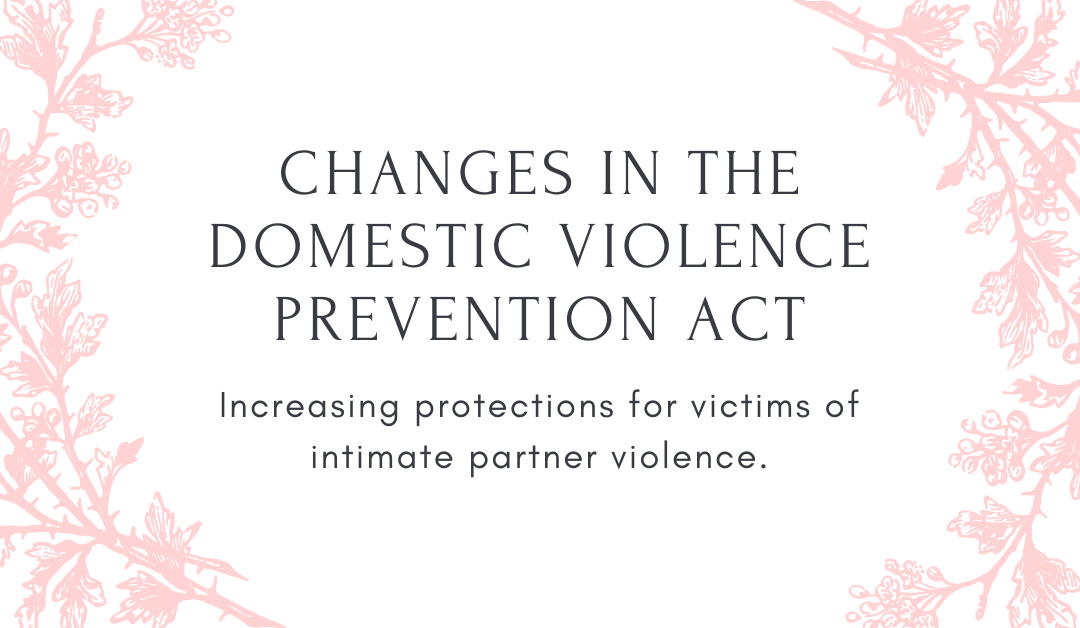Increasing Protections for Victims of Intimate Partner Violence
This past September, the California State legislature voted to approve critical changes to California’s Domestic Violence Prevention Act (“DVPA”). These changes, which went into effect on January 1, 2021, broadens the definition of domestic violence and increases protections for victims of domestic violence. This article contains details about the changes to the California Family Code. It also provides information related to the reason for the change.
Currently, the Domestic Violence Prevention Act recognizes a series of behaviors that form the basis for a request for a Domestic Violence Restraining Order. These behaviors include: 1) physical acts of aggression and violence, 2) impersonating someone, 3) causing fear of violence, 4) harassing behavior such as annoying telephone calls or text messages, 5) stalking, 6) destroying personal property and, 7) “disturbing the peace of the other party.” The last behavior, ‘disturbing the peace,’ is at the heart of the changes taking effect on January 1, 2021 and includes clarification and an expansion of the phrase’s meaning.
Our current understanding of the meaning of “disturbing the peace” has been defined by a series of court cases over the past two decades. These cases recognize that physical abuse of a child in a parent’s presence, abuse of a pet, and the disclosure of intimate details to third are actions that can disturb someone’s “peace.” However, these rulings leave a question: is the conduct in question something that would “destroy the mental or emotional calm” of the person requesting the restraining order?
In September 2020, our state legislature passed SB-1141, which expands the definition of ‘disturbing the peace’ in a few important ways. First, it now reflects that the conduct that disturbs the peace doesn’t have to happen in person. The conduct can occur by phone, through online accounts, text messages, internet-connected devices, or other electronic technology.
Second, the code now recognizes that disturbing the peace includes “coercive control.” Coercive control includes, but is not limited to, being subjected to any of the following efforts, specifically related to the use of technology:
- Isolation from friends and family, or other sources of support;
- withholding basic necessities;
- controlling and monitoring movements;
- controlling and restricting monetary resources or access to services;
- compelling behavior through threats of force and/or intimidation causing someone not to do something they have right to do;
- making threats related to an individual’s immigration status.
By implementing this change in California’s Family Code, the state legislature ensures that there is no doubt about the expanding and evolving forms of intimate partner violence. Ultimately, the court examines intimate partner violence on a subjective basis as what is normal for one couple may not be for another. Some couples may choose to consensually share information, such as locations, through a cell phone. For others, that may be a form of control and invasion of privacy. This change will help judicial officers understand potentially abusive behavior.
This change is a victory for victims of these types of abusive actions since current case law does not expressly recognize that the above conduct is abusive and leaves related judgements to the judge’s discretion. The codification of these actions as abuse significantly reduces the need to rely on attorneys to educate judicial officers on why these acts are abusive.
About Gomez Edwards Law Group
Gomez Edwards Law Group is a top family law and estate planning law firm located in Santa Clara, CA. Founded by Natalie Gomez and Lauren Edwards, the Silicon Valley firm features a savvy team of lawyers who are highly skilled and passionate about providing legal solutions for their clients needs. Areas of expertise include the matters of divorce, child custody, mediation, pre- and post marital agreements, wills, trusts, and more. In addition, our attorneys strive to provide a caring and supportive environment for their clients as litigation cases may at times be stressful. Gomez Edwards Law Group is a women-owned and minority-owned law firm. For more information, visit GomezEdwardsLawGroup.com
Legal Disclaimer: The materials contained on this website have been prepared by Gomez Edwards Law Group, LLP, and are intended for informational purposes only. This website contains general information on legal issues and is not a substitute for legal advice from a qualified attorney licensed in the appropriate jurisdiction. While we attempt to maintain information on this website as accurately as possible, the materials and information may contain errors or omissions, and may be out-of-date, for which we disclaim liability. Gomez Edwards Law Group, LLP expressly disclaims all liability with respect to actions taken or not taken based on any or all of the contents of this website. The information on this website is for general information purposes only. Nothing on this site should be taken as legal advice for any individual case or situation. This information is not intended to create, and receipt or viewing does not constitute, an attorney-client relationship.

Recent Comments